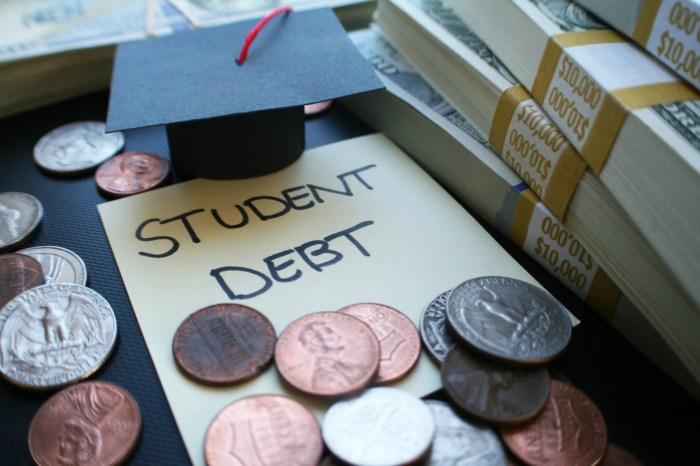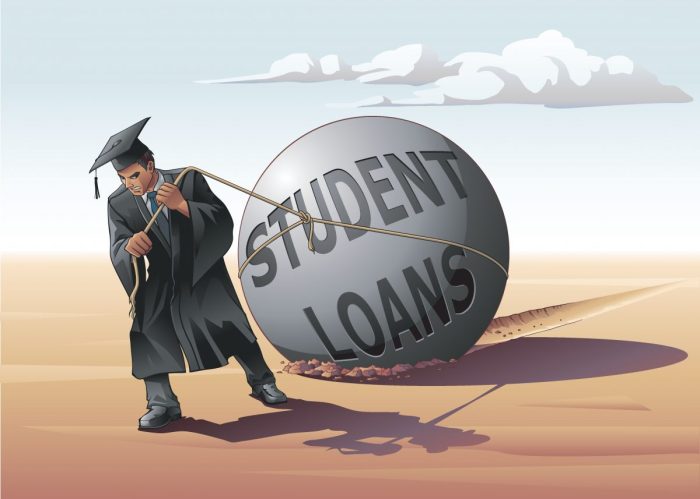
Navigating the complexities of student loans can be daunting, especially within the specific context of Louisiana. This guide delves into the various student loan programs available to Louisiana residents, outlining eligibility criteria, interest rates, and repayment options. We’ll explore income-driven repayment plans, loan forgiveness programs, and debt management resources, providing a comprehensive overview to empower borrowers to make informed decisions.
Beyond the specifics of Louisiana’s loan programs, we’ll examine the broader economic impact of student loan debt on the state’s workforce and residents. Understanding the legal protections afforded to borrowers is equally crucial, and we will address common challenges, such as disputing errors or managing loan defaults. Real-life scenarios will illustrate the practical applications of the information presented, offering a clear and actionable path toward responsible student loan management.
Repayment Options and Forgiveness Programs in Louisiana

Navigating student loan repayment can be complex, but understanding the available options and programs is crucial for Louisiana borrowers. This section Artikels the various repayment plans and forgiveness opportunities to help you manage your student loan debt effectively. Remember to consult the official websites of your loan servicers and the U.S. Department of Education for the most up-to-date and accurate information.
Available Repayment Plans for Louisiana Student Loan Borrowers
Several repayment plans cater to different financial situations. Choosing the right plan depends on your income, loan amount, and financial goals. Understanding the nuances of each plan is key to making an informed decision.
- Standard Repayment Plan: This plan involves fixed monthly payments over a 10-year period. It’s the simplest option but may result in higher monthly payments compared to income-driven plans.
- Graduated Repayment Plan: Payments start low and gradually increase over time. This can be helpful initially but leads to higher payments later in the repayment period.
- Extended Repayment Plan: This plan extends the repayment period to up to 25 years, lowering monthly payments but increasing the total interest paid.
- Income-Driven Repayment (IDR) Plans: These plans link your monthly payments to your income and family size. Several IDR plans exist, including Income-Based Repayment (IBR), Pay As You Earn (PAYE), Revised Pay As You Earn (REPAYE), and Income-Contingent Repayment (ICR). These plans typically offer lower monthly payments and potentially lead to loan forgiveness after 20 or 25 years, depending on the plan and your income.
Applying for Income-Driven Repayment Plans
Applying for an IDR plan usually involves these steps:
- Gather Necessary Information: Collect your tax returns, W-2 forms, and other documentation demonstrating your income and family size.
- Complete the Application: Access the application through your student loan servicer’s website or the Federal Student Aid website (studentaid.gov).
- Submit Supporting Documents: Upload or mail the required documentation to your loan servicer.
- Review and Approval: Your servicer will review your application and notify you of the approval or any required additional information.
- Monitor Your Account: Regularly check your account to ensure your payments are correctly calculated based on your income.
Student Loan Forgiveness Programs in Louisiana
Louisiana doesn’t offer state-specific student loan forgiveness programs. However, Louisiana residents are eligible for federal forgiveness programs, such as Public Service Loan Forgiveness (PSLF) and Teacher Loan Forgiveness. These programs require specific employment in qualifying fields and adherence to repayment plan guidelines.
Benefits and Drawbacks of Repayment Options
The choice of repayment plan involves trade-offs. IDR plans offer lower monthly payments but may extend the repayment period and increase total interest paid. Standard repayment plans have higher monthly payments but a shorter repayment term and less overall interest. Extended repayment plans lower monthly payments but significantly increase total interest. Careful consideration of your financial situation and long-term goals is crucial. For example, a borrower with a low income might benefit from an IDR plan, while a borrower with a higher income and desire for faster debt repayment might prefer a standard repayment plan. Each individual’s circumstances will dictate the most suitable option.
Student Loan Debt Management Resources in Louisiana

Navigating student loan debt can be challenging, but Louisiana offers various resources to help borrowers manage their repayment effectively. These resources provide crucial support, from financial counseling to debt management strategies, empowering individuals to take control of their financial futures. Understanding the available options is the first step towards achieving financial well-being.
Organizations Offering Free Student Loan Counseling Services in Louisiana
Several organizations in Louisiana provide free or low-cost student loan counseling services. These services are invaluable for borrowers needing guidance on repayment plans, budgeting, and understanding their options. Accessing these resources can significantly reduce stress and improve financial outcomes.
- The Louisiana Department of Education: While not a direct counseling provider, the Louisiana Department of Education often partners with or directs individuals to organizations that offer such services. Their website may contain helpful links and information on available programs.
- Consumer Credit Counseling Services (CCCS): Many CCCS agencies operate throughout Louisiana. These agencies typically offer credit counseling and debt management services, including assistance with student loans. It’s advisable to check their website or contact them directly to confirm the services offered in your specific area.
- Nonprofit Credit Unions: Some Louisiana-based nonprofit credit unions provide financial literacy programs and counseling services to their members, which may include guidance on student loan repayment.
Reputable Non-profit Organizations Providing Assistance with Student Loan Debt Management
Nonprofit organizations play a crucial role in assisting individuals struggling with student loan debt. Their expertise and resources provide much-needed support in navigating complex repayment options and developing sustainable financial strategies.
- National Foundation for Credit Counseling (NFCC): The NFCC is a national organization with a network of certified credit counselors. They can provide guidance on budgeting, debt management plans, and exploring options such as income-driven repayment plans.
- United Way of Louisiana: United Way often connects individuals with local resources and support services, which may include referrals to organizations providing student loan debt management assistance.
- Local Community Action Agencies: These agencies often offer various social services, including financial assistance programs and referrals to credit counseling services, which can be helpful for those struggling with student loan debt.
Services Offered by Student Loan Debt Management Organizations
These organizations offer a range of services designed to help borrowers manage their student loan debt effectively. These services are vital in creating a path towards financial stability and reducing the overwhelming burden of student loan repayments.
- Budgeting and Financial Literacy: Many organizations provide workshops and individual counseling sessions to help borrowers create and stick to a realistic budget. This involves tracking expenses, identifying areas for savings, and developing strategies for debt repayment.
- Debt Consolidation: Some organizations can help borrowers explore options for consolidating multiple student loans into a single loan with a potentially lower interest rate or more manageable monthly payments. However, this is not always the best solution and should be carefully considered.
- Loan Negotiation and Repayment Plan Assistance: Organizations can assist borrowers in negotiating with their loan servicers to explore options such as income-driven repayment plans, forbearance, or deferment. They can help borrowers understand their rights and responsibilities under federal and private loan programs.
Finding Reliable Student Loan Debt Assistance Resources in Louisiana
Locating reliable assistance requires proactive research and due diligence. Begin by utilizing online search engines to identify organizations in your area. Always verify the organization’s legitimacy and ensure they are reputable and non-profit before sharing sensitive financial information. Check for certifications and affiliations with recognized organizations like the NFCC. Contacting your local university’s financial aid office can also provide valuable referrals and guidance.
Impact of Student Loans on Louisiana’s Economy
Student loan debt significantly impacts Louisiana’s economy, affecting workforce participation, homeownership rates, and the overall financial well-being of its residents. The high levels of debt burden individuals and families, hindering economic growth and prosperity across the state. Understanding this impact is crucial for developing effective policies to mitigate its negative consequences.
Effects of Student Loan Debt on the Louisiana Workforce
The substantial student loan debt carried by many Louisiana residents can influence their career choices and economic mobility. Individuals may be forced to prioritize jobs that offer immediate income over those requiring further education or training, potentially limiting their long-term earning potential. Furthermore, high debt levels can lead to delayed homeownership, reduced savings, and decreased investment in businesses, all of which stifle economic growth within the state. This can manifest as a lower participation rate in the workforce for those struggling to manage their debt.
Relationship Between Student Loan Debt and Homeownership Rates in Louisiana
Student loan debt is strongly correlated with lower homeownership rates. The significant monthly payments required to service student loans often reduce disposable income, making it challenging for borrowers to save for a down payment, cover closing costs, and manage ongoing mortgage payments. This effect is particularly pronounced in Louisiana, where homeownership is already a significant challenge for many due to various factors including cost of living. Consequently, the high levels of student loan debt exacerbate existing inequalities and further depress homeownership rates.
Economic Burden of Student Loan Debt on Louisiana Residents
Data from the U.S. Department of Education and other reliable sources illustrate the significant economic burden of student loan debt on Louisiana residents. For example, [Insert specific data on average student loan debt in Louisiana, percentage of borrowers, and default rates. This data should be cited with a reliable source]. This debt limits consumer spending, reduces investment in local businesses, and hinders overall economic growth. The burden is disproportionately felt by lower-income individuals and families, perpetuating cycles of poverty and hindering social mobility.
Comparison of Louisiana’s Student Loan Debt Burden to Other States
| State | Average Student Loan Debt | Percentage of Borrowers | Economic Impact Indicators (e.g., GDP per capita, homeownership rate) |
|---|---|---|---|
| Louisiana | [Insert Data with Source Citation] | [Insert Data with Source Citation] | [Insert Data with Source Citation, e.g., GDP per capita, homeownership rate, percentage of population with student loan debt] |
| [Comparison State 1, e.g., Texas] | [Insert Data with Source Citation] | [Insert Data with Source Citation] | [Insert Data with Source Citation] |
| [Comparison State 2, e.g., Mississippi] | [Insert Data with Source Citation] | [Insert Data with Source Citation] | [Insert Data with Source Citation] |
| [Comparison State 3, e.g., National Average] | [Insert Data with Source Citation] | [Insert Data with Source Citation] | [Insert Data with Source Citation] |
Legal Protections for Louisiana Student Loan Borrowers
Navigating the complexities of student loan repayment can be challenging, but Louisiana borrowers have several legal protections designed to safeguard their rights and ensure fair treatment. Understanding these protections is crucial for effectively managing student loan debt and avoiding potential pitfalls. This section Artikels key legal rights and the processes for addressing common issues.
Disputing Errors on Student Loan Statements
Borrowers have the right to dispute any inaccuracies or errors appearing on their student loan statements. This might include incorrect payment amounts, inaccurate interest accrual calculations, or misreported loan balances. The first step involves contacting the loan servicer directly in writing, clearly outlining the specific discrepancies and providing supporting documentation if possible. This documentation could include bank statements, previous payment confirmations, or any other evidence supporting the borrower’s claim. If the servicer fails to resolve the issue satisfactorily, the borrower can escalate the complaint to the relevant regulatory bodies, such as the Consumer Financial Protection Bureau (CFPB) or the Louisiana Attorney General’s office. Persistence and detailed record-keeping are essential throughout this process.
Addressing Issues with Student Loan Servicers
Student loan servicers are responsible for providing accurate information, processing payments correctly, and responding promptly to borrower inquiries. If a borrower experiences difficulties communicating with their servicer, encounters unresponsive customer service, or suspects unfair or unethical practices, several avenues for recourse exist. Borrowers can formally complain to the servicer, documenting all communication attempts and responses. They can also file complaints with the CFPB or the Louisiana Attorney General’s office, providing detailed accounts of their experiences. These agencies have the authority to investigate complaints and take action against servicers engaging in improper conduct. Additionally, borrowers can seek assistance from consumer advocacy groups specializing in student loan issues.
Addressing Student Loan Default in Louisiana
Defaulting on student loans can have severe consequences, including damage to credit scores, wage garnishment, and tax refund offset. In Louisiana, as in other states, borrowers facing imminent default should take immediate action. This involves contacting their loan servicer to explore available repayment options, such as income-driven repayment plans or deferment or forbearance programs. Borrowers should also consider seeking professional guidance from a credit counselor or student loan attorney. These professionals can help navigate the complex legal landscape and explore potential solutions, including loan rehabilitation or consolidation programs. Early intervention is key to mitigating the negative impacts of default. Failure to act proactively can lead to escalating legal actions, including lawsuits and judgments against the borrower.
Illustrative Examples of Student Loan Scenarios in Louisiana
Understanding the diverse experiences of Louisiana students with student loans requires examining specific scenarios. These examples illustrate the range of challenges and opportunities faced by borrowers, highlighting the importance of informed decision-making and proactive management.
Significant Debt and Repayment Navigation
Maria, a recent graduate of Louisiana State University, completed her degree in engineering with $100,000 in student loan debt. This debt accumulated from federal and private loans taken over her four years of study. Initially overwhelmed, Maria explored her repayment options. She considered an income-driven repayment plan, which would adjust her monthly payments based on her income and family size. She also researched options for loan consolidation, potentially lowering her interest rate and simplifying her payments. After careful consideration and consultation with a financial advisor, she opted for a combination of income-driven repayment and refinancing with a private lender offering a lower interest rate. This strategy allowed her to manage her debt effectively while maintaining a reasonable standard of living.
Successful Utilization of a Loan Forgiveness Program
John, a Louisiana resident, worked as a teacher in a low-income school district for ten years. He qualified for the Public Service Loan Forgiveness (PSLF) program. This program forgives the remaining balance on federal student loans after 120 qualifying monthly payments are made under an income-driven repayment plan. John diligently made his payments and met all the program requirements. After ten years of service, his remaining student loan debt was forgiven, significantly improving his financial situation and allowing him to focus on his career and personal goals. He meticulously tracked his payments and ensured his employer certified his employment correctly to avoid any potential issues.
Challenges Faced by a Student with Defaulted Student Loans
David, a former student at a community college in Louisiana, defaulted on his student loans. This happened due to a combination of job loss and unexpected medical expenses. The consequences were severe. His credit score plummeted, impacting his ability to secure loans, rent an apartment, or even obtain certain jobs. Collection agencies began pursuing him aggressively, and his wages were garnished. David is now working with a non-profit credit counseling agency to explore options for rehabilitation or consolidation of his loans to mitigate the long-term financial damage. He is also actively seeking financial literacy resources to prevent future financial hardship.
Positive Impact of Proactive Student Loan Management
Sarah, a graduate of Tulane University, proactively managed her student loan debt from the start. She carefully budgeted her expenses, created a repayment plan immediately after graduation, and made extra payments whenever possible. By prioritizing her student loan repayment, she paid off her debt significantly faster than expected. This proactive approach allowed her to save money on interest payments and improve her credit score. The freedom from student loan debt has allowed her to focus on saving for a down payment on a house and investing in her future. She regularly reviews her financial situation and adjusts her budget as needed to maintain her financial well-being.
Epilogue

Successfully managing student loan debt requires knowledge, planning, and proactive engagement. This guide has provided a framework for understanding the Louisiana student loan landscape, from available programs and repayment options to debt management resources and legal protections. By leveraging the information provided, Louisiana students and borrowers can navigate the complexities of repayment, minimize financial strain, and ultimately achieve their financial goals. Remember to utilize available resources and seek professional guidance when needed to ensure a positive outcome.
Helpful Answers
What happens if I miss a student loan payment in Louisiana?
Missing payments can lead to late fees, damage your credit score, and potentially result in loan default. Contact your loan servicer immediately if you anticipate difficulty making a payment to explore options like deferment or forbearance.
Can I consolidate my Louisiana student loans?
Yes, loan consolidation combines multiple loans into a single loan with a new interest rate and repayment plan. This can simplify repayment but may not always lower your overall cost. Explore options carefully.
Where can I find free credit counseling in Louisiana?
Several non-profit credit counseling agencies offer free or low-cost services. The National Foundation for Credit Counseling (NFCC) is a good starting point to locate reputable agencies in your area.
What are the consequences of student loan default in Louisiana?
Default can lead to wage garnishment, tax refund offset, and damage to your credit. It can also make it difficult to obtain future loans or credit. Contact your servicer immediately if you’re struggling to avoid default.
